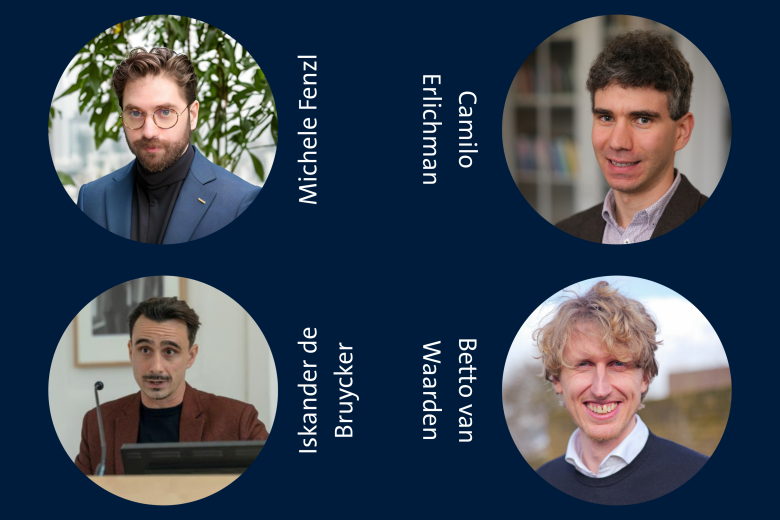From here …. to a sustainable Maastricht University in 2035
The road to sustainability is certainly not a one-way street and cannot be walked in just one day. Walking the road together takes time and requires dedication and cooperation. In the coming years, we will take steps to make our university more sustainable. The UM Sustainability Roadmap 2030 has been drawn up to realise our sustainable ambition. This roadmap focuses on three main ambitions: a thriving UM community, a circular UM campus and a climate-neutral university by 2035. These ambitions will be gradually integrated within our pillars of education, research and operations.
The UM Sustainability Office is working on more than forty projects that stem from the Sustainability Roadmap 2030 – and for some, the first results are already visible. Since her appointment as Rector Magnificus of UM, Pamela Habibović has been committed to making our university more sustainable. She is a member of the Sustainability Supervisory Board and considers the sustainability of our university one of her priorities. “The continuous focus on sustainability and the development and integration of activities and measures towards a sustainable society in our education, research and operations ensure that we can make an important contribution to society and future generations. As an Executive Board member, you constantly make choices, but we continue to follow the path towards a sustainable university as a common thread.”
In the coming weeks, sustainability will once again be emphasized within our university. Following the launch of the UM Sustainability Roadmap 2030 before the summer of 2025, we want to continue and deepen the conversation about our sustainability ambitions. “It is important for our UM community to know that we as a university are pursuing these ambitions,” emphasises Pamela Habibović. “We can only achieve this with an active community. As a university, we serve as a role model for society – so let's make sure we do it right ourselves.”
Climate-neutral university
At this point, we want to gain insight into the impact of our practices on sustainability as soon as possible. Where do we stand and where can we improve our processes? Regarding our business operations, a post-doctoral researcher is currently mapping our scope 1 and 2 emissions (greenhouse gas emissions related to our own assets and energy consumption), as well as the most important categories of scope 3 emissions (greenhouse gas emissions in our value chain, including emissions related to business travel, waste processing and purchased goods and services). The results of this research should inform us about the best steps we can take towards climate-neutral business operations by 2035.
UM Impact Dashboard
Another project that will soon be launched is the UM Impact Dashboard. This is a first step towards providing better information about our sustainability performance through reporting. We are currently identifying potential sustainability indicators that we aim to include in sustainability reporting in the short and long term to better monitor our sustainability performance, and to be able to take action towards sustainability. We do this in collaboration with various stakeholders within UM. We aim to align as much as possible with international and national developments, such as the “Handreiking Vrijwillige Duurzaamheidsrapportage Kennisinstellingen” (Voluntary Guidelines for Sustainability Reporting by Knowledge Institutions).
(Text continues below the photo)


Launced projects
Several projects have been launched already. For example, the pilot of the Fossil Assessment Framework provides an assessment framework for research proposals to assess the possible impact on the transition to a fossil-free society. This framework is partly based on UM-wide dialogues with staff and students, in which they could share their views.
Circularity is the central theme of one of the two research calls that we opened in 2025. In addition to the circularity call, we also opened a call for research projects that contribute to the sustainability of UM. In total, €600,000 has been made available (max. €75,000 per applicant).
To enhance the integration of sustainability into education, an education grant has been made available to facilitate and support lecturers in incorporating sustainability into the curriculum.
Building a community with a sustainable mindset
The Green Network is the beating heart of our sustainable community across the UM. Each faculty has its own Green Team, composed of students and staff. Together, they work on projects that contribute to a shared vision and approach regarding sustainability within the university. We want to involve students and staff even more actively in sustainability. That is why we will soon publish a questionnaire to assess what sustainability means to them and which topics they consider important. The results will help us to set the right priorities, identifying barriers and will enable us to take opportunities.
The next stepping stones
“Sometimes, it takes some exploration and adjusting, but we are following the road towards a circular campus, a thriving community and a climate-neutral university by 2035 together. Most sustainability projects are broad in scope, which is why it is important to constantly engage in dialogue and support each other – only through collaboration, can we truly realise our ambitions,” says Pamela Habibović.
Also read
-
Four FASoS researchers awarded NWO XS grants
How do lobbyists use disinformation to sway policymakers? Who gets to shape the historical narrative of occupation and violence? Does growing inequality change the way citizens think about politics? And how have politicians defended “truth” across a century of media revolutions?
-
Reducing the Digital Divide: Empowering Students to Train, Evaluate, and Use AI Text Models
The Maastricht Law and Tech Lab, together with the Brightlands Institute for Smart Society (BISS), obtained a € 100.000 a Comenius Senior Teaching Fellow grant.
-
Green school playgrounds boost concentration and wellbeing
Children at schools with green playgrounds are better able to concentrate and display more social behaviour. This is the conclusion of a follow-up study within the long-running project The Healthy Primary School of the Future .